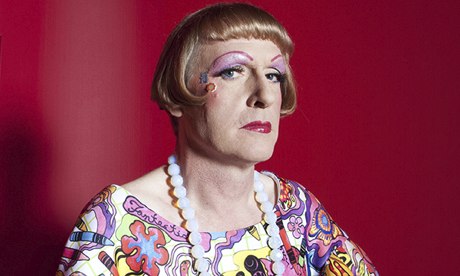
The Reith Lectures (Radio 4) | iPlayer
The John Peel Lecture (6 Music) | iPlayer
6 Music Live at Maida Vale (6Music) | iPlayer
This first of this year's Reith Lectures, given by the Turner prize-winning potter Grayson Perry, was an absolute delight. Perry is such a fantastic speaker: a performer with gags like a standup, but also a thinker with a point to make. Confident enough to wander around a subject, poking it, opening it up, tickling it into revealing itself. I saw his lecture live – it was recorded about a month ago at Tate Modern – and there were no PowerPoint lists, no TED-style speechifying about My One Important Idea. "I'm not," said Perry, "a certainty freak." How refreshing.
His subject was art, his lecture's title "Democracy Has Bad Taste". Perry explored the idea that the most popular art isn't necessarily the best, giving us little anecdotes and bons mots along the way. So we learned that at least one very important curator saw the David Hockney show at the Royal Academy last year and deemed it one of the worst she'd ever seen, despite its enormous popularity with the public (it was the fifth most attended exhibition in the world that year).
We also heard about some Belgian artists who asked people what they wanted in an artwork and then made it. In every country, people wanted "nice landscapes, with a few figures and animals in the foreground, mainly blue".
What was interesting was that, although the delivery was far from standard (most Reith lectures are very "read", with dry literary jokes and clever allusions; Perry was far more freestyle), his conclusion was surprisingly conservative. He said that there exists a collection of people in the know – certain curators, collectors, critics, artists – who deem an artist worth our while and that, actually, those people are usually correct. But he masked this small-c conservatism by reminding us that we didn't have to always agree with those people, and remembered his first bad review. It began: "If I had a hammer… ".
When Radio 4 controller Gwyneth Williams announced that she wanted more culture on the station, I wondered if she would dare. It's all very well making neat 30-minute documentaries about art and its consequences, but many artists are loopy, charismatic personalities, with odd takes on the world. They sweep you up with their crazy charm, they don't conform to Radio 4's politesse. It was genuinely lovely to hear Perry fly.
Another excellent lecture could be heard – on Monday, at midnight – on 6 Music. This was the third John Peel Lecture, established by the Radio festival in honour of Peel. Pete Townshend and Billy Bragg were the first two speakers. This year we got Charlotte Church.
Church doesn't easily fit into the 6 Music remit, but then, as she pointed out, she doesn't really fit anywhere any more. She thinks this is partly because, after an early career that promoted her as an innocent carolling angel, she was then, almost overnight, advised to show off her "great body" in a basque and stockings while singing a rubbish pop song that she didn't even write herself. Now she finds it hard to be taken seriously, difficult to get her music heard in the places it would naturally fit.
Church's speech packed a punch. She used her own experience, and that of other women in the industry, to examine how the music business treats them. The answer, depressingly, unsurprisingly, was not too well. The problem with music is that it has long-established stereotypes it is unwilling to give up. She listed a few: One of the Girls, The Victim and – the most common – The Sex-bot.
Personally, I can do without yet more palavers over the dull-as-ditchwater-in-teeny-pants Miley Cyrus and Michael-Bublé-with-a-hard-on Robin Thicke, but some of Church's research was very revealing. She informed us that Thicke answered a question about whether his video for Blurred Lines degraded women with this: "Of course! What a pleasure it is to degrade a woman!" I'd put my palm to my brow if my hand wasn't busy punching the wall.
I enjoyed Jane Garvey's interview with Church after the lecture too. Garvey asked whether she had changed her mind about sexual imagery in pop videos after she'd had her daughter. Church's reply – that she was as worried for her small son as she was for her daughter – was right and true.
Oh dear. Church's speech was great, but it was nothing we hadn't heard before. Sometimes you can feel as though nothing will ever change, that boring and repetitive pornified versions of sex roles are all pop music has to offer.
In case you're feeling like that, may I recommend Goldfrapp's live version of Annabel, as performed for 6 Music's excellent Live at Maida Vale series last week? It will remind you, in a moving and beautiful manner, that women have something more to offer music than "flaunting" their "curves".

